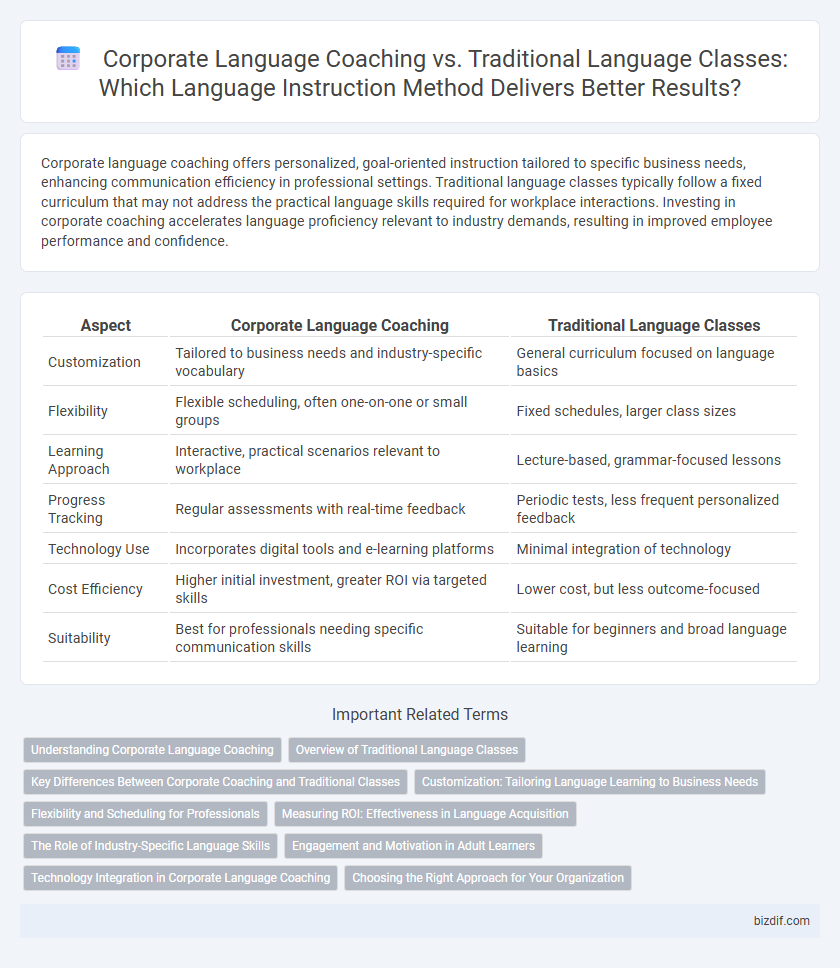Corporate language coaching offers personalized, goal-oriented instruction tailored to specific business needs, enhancing communication efficiency in professional settings. Traditional language classes typically follow a fixed curriculum that may not address the practical language skills required for workplace interactions. Investing in corporate coaching accelerates language proficiency relevant to industry demands, resulting in improved employee performance and confidence.
Table of Comparison
| Aspect | Corporate Language Coaching | Traditional Language Classes |
|---|---|---|
| Customization | Tailored to business needs and industry-specific vocabulary | General curriculum focused on language basics |
| Flexibility | Flexible scheduling, often one-on-one or small groups | Fixed schedules, larger class sizes |
| Learning Approach | Interactive, practical scenarios relevant to workplace | Lecture-based, grammar-focused lessons |
| Progress Tracking | Regular assessments with real-time feedback | Periodic tests, less frequent personalized feedback |
| Technology Use | Incorporates digital tools and e-learning platforms | Minimal integration of technology |
| Cost Efficiency | Higher initial investment, greater ROI via targeted skills | Lower cost, but less outcome-focused |
| Suitability | Best for professionals needing specific communication skills | Suitable for beginners and broad language learning |
Understanding Corporate Language Coaching
Corporate Language Coaching tailors language instruction to specific professional contexts, enhancing communication skills in real workplace scenarios. It emphasizes personalized feedback and practical application of language relevant to industry-specific terminology and business etiquette. This targeted approach improves employee language proficiency more efficiently than traditional language classes, which often follow a generic curriculum.
Overview of Traditional Language Classes
Traditional language classes typically follow a structured curriculum delivered in a classroom setting, focusing on grammar, vocabulary, reading, and writing skills. These classes often prioritize standardized tests and theoretical knowledge over practical communication and real-world application. Large group sizes and fixed schedules can limit personalized attention and flexibility for individual learners.
Key Differences Between Corporate Coaching and Traditional Classes
Corporate language coaching offers personalized, goal-oriented sessions tailored to specific workplace communication needs, contrasting with traditional language classes that follow a standardized curriculum for a general audience. Corporate coaching emphasizes practical application in professional contexts, enhancing skills such as business negotiations and presentations, whereas traditional classes often focus on grammar and language fundamentals. The flexible scheduling and one-on-one format of corporate coaching improve engagement and retention compared to the fixed timetable and larger group settings common in traditional courses.
Customization: Tailoring Language Learning to Business Needs
Corporate language coaching offers personalized language instruction tailored specifically to a company's industry, goals, and communication challenges, ensuring relevant vocabulary and scenarios are prioritized. Unlike traditional language classes with standardized curricula, corporate coaching adapts content and pacing to meet the unique needs of business professionals. This customization enhances practical language application and accelerates skill acquisition for effective workplace communication.
Flexibility and Scheduling for Professionals
Corporate language coaching offers unparalleled flexibility by tailoring session times to fit professionals' busy schedules and urgent project deadlines, unlike traditional language classes with fixed timetables. Professionals benefit from one-on-one or small group coaching that adapts to their preferred learning paces and time zones, enhancing productivity and engagement. This personalized scheduling ensures consistent progress without disrupting demanding work commitments, making corporate coaching a superior choice for career-focused language acquisition.
Measuring ROI: Effectiveness in Language Acquisition
Corporate language coaching demonstrates higher ROI by tailoring instruction to specific business contexts, resulting in faster language acquisition and improved employee performance. Unlike traditional language classes, corporate coaching provides measurable outcomes through pre- and post-assessments aligned with workplace language needs. Enhanced fluency and practical skills gained from targeted coaching directly contribute to increased productivity and communication efficiency.
The Role of Industry-Specific Language Skills
Corporate language coaching emphasizes industry-specific language skills tailored to professional contexts, enhancing employees' ability to communicate effectively within their sector. Traditional language classes often focus on general language proficiency, lacking the specialized vocabulary and practical applications needed for specific industries. Developing targeted language competencies in corporate settings leads to improved workplace communication, higher productivity, and better client interactions.
Engagement and Motivation in Adult Learners
Corporate language coaching enhances engagement and motivation in adult learners through personalized, real-world applications tailored to specific job roles, unlike traditional language classes that often rely on generic curricula. This targeted approach increases learner investment by directly connecting language skills to professional success and daily workplace communication. Interactive methodologies and continuous feedback in coaching further sustain motivation by addressing individual challenges and celebrating progress.
Technology Integration in Corporate Language Coaching
Corporate Language Coaching leverages advanced technology such as AI-driven language apps, virtual reality simulations, and real-time speech analytics to deliver personalized and immersive learning experiences. Unlike traditional language classes, which often rely on static textbooks and in-person lectures, corporate coaching integrates cloud-based platforms that enable continuous progress tracking and adaptive lesson customization. This tech integration enhances learner engagement, accelerates skill acquisition, and aligns language training with specific professional contexts.
Choosing the Right Approach for Your Organization
Corporate language coaching delivers customized learning tailored to your organization's specific industry vocabulary and communication goals, ensuring practical application in workplace scenarios. Traditional language classes offer structured curricula ideal for foundational language skills but may lack relevance to specialized business contexts. Selecting the right approach depends on prioritizing either targeted professional development or broad language proficiency to align with your organization's objectives and employee needs.
Corporate Language Coaching vs Traditional Language Classes Infographic

 bizdif.com
bizdif.com